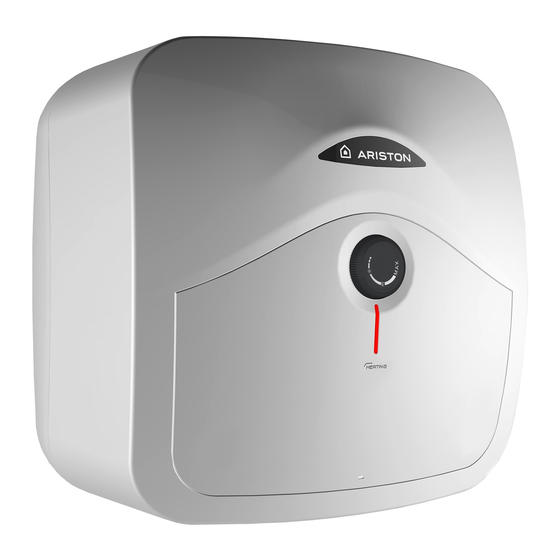- ページ 11
ウォーターヒーター Ariston ABS ANDRIS2 R 10 OのPDF 設置、使用、メンテナンスに関する説明書をオンラインで閲覧またはダウンロードできます。Ariston ABS ANDRIS2 R 10 O 36 ページ。

LEGIONELLA BACTERIA FUNCTION
Legionella are small rod shaped bacteria which are a natural constituent of all fresh waters. Legionaries' dis-
ease is a pneumonia infection caused by inhaling of Legionella species. Long periods of water stagnation
should be avoided; it means the water heater should be used or flushed at least weekly.
The European standard CEN/TR 16355 gives recommendations for good practice concerning the prevention of
Legionella growth in drinking water installations but existing national regulations remain in force.
This electro-mechanical storage water heater is sold with a thermostat set at a temperature higher than 60°C; it
means it is enabled to carry out a "thermal disinfection cycle" to restrict the Legionella growth inside the tank.
Warning: when this software has been carrying out the thermal disinfection treatment, water temperature can
cause burns. Feel water before bathing or showering.
TECHNICAL CHARACTERISTICS
For the technical specifications, refer to the nameplate (the nameplate is located next to the water intake/outlet
pipes).
Product range
Weight (kg)
Installation
Model
Storage Volume (l)
This appliance is conforming with the international electrical safety standards IEC 60335-1
and IEC 60335-2-21. This product is in conformity with REACH regulations.
INSTALLING NORMS (for the installer)
This product must be installed vertically to operate correctly. Once installation is complete, and before
any water is added or the power supply is connected, use a measuring instrument (i.e. a spirit level) to
check that the device has been installed perfectly vertical.
The appliance heats water to a temperature below boiling point. It must be linked up to a mains water supply
according to the appliance performance levels and capacity. Before connecting the appliance, it is first nec-
essary to:
- Check whether the characteristics (please refer to the data plate) meet the customer's requirements.
- Make sure the installation conforms to the IP degree (of protection against the penetration of liquids) of the
appliance according to the applicable norms in force.
- Read the instructions provided on the packaging label and on the appliance data plate.
This appliance was designed to be installed only inside buildings in compliance with the applicable norms in
force. Furthermore, installers are requested to keep to the following advice in the presence of:
- Damp: do not install the appliance in closed (unventilated) and damp rooms.
- Frost: do not install the appliance in areas where the temperature may drop critically and there may be a risk
that ice may form.
- Sunlight: do not expose the appliance to direct sunrays, even in the presence of windows.
- Dust/vapours/gas: do not install the appliance in the presence of particularly dangerous substances such
as acidic vapours, dust or those saturated with gas.
- Electrical discharges: do not install the appliance directly on electrical supplies that aren't protected
against sudden voltage jumps.
In the case of walls made of bricks or perforated blocks, partition walls featuring limited static, or masonry
different in some way from those stated, you first need to carry out a preliminary static check of the supporting
system.
The wall-mounting fastening hooks must be designed to support a weight that is three times higher than the
weight of the water heater filled with water. We recommend installing the appliance as close as possible to the
delivery points to minimise heat loss along the pipes. Local regulations may provide for restrictions on installa-
tion in bathrooms; observe any regulatory minimum distances. To facilitate maintenance, make sure there is a
clearance of at least 50 cm inside the enclosure for access to the electrical equipment.
Table 1 - Product information
10
6,6
Oversink
Undersink
10
15
7,4
Oversink
Undersink
Refer to the nameplate
15
EN
30
12,8
Oversink
30
11
